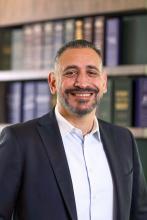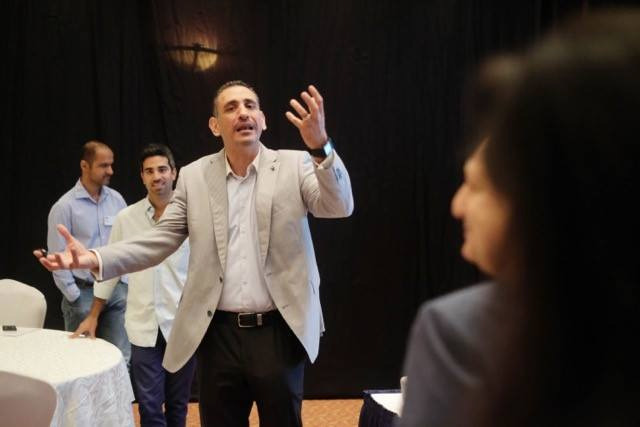Interview with Suhail Jouaneh

Grow Learn Connect: Suhail, I am sure when biographers finally publish a book about you, the readers would be amazed at your drastic career switch from the dental surgeon to the mindset surgeon. What made you give up your career in the medical field?
Suhail Jouaneh: I believe that everything in my life happens for a good reason. There had always been signals and signs that I was able to see and opportunities that I grasped.
It all started at the university when I used to volunteer in youth clubs, doing translations and radio work. Then when I practiced as a dentist, I often had spare time between appointments. So, I did more translation, radio work, and youth camps. I felt I had the capacity to help others, mentor and coach. I have always received good feedback.
So, after 12 years of the full-time dental work, I decided to gradually shift my career focus. I volunteered with an international leadership institute where I got trained, and then I started training others.
In the meantime, my wife and partner Abeer launched a “Better Business”. She asked for help designing materials and conducting training on communication. Business grew, and so did my passion for training, which eventually became a full-time job. Once I stepped on this career path, I kept developing my skills with multiple certifications and a lot of practice.
GLC: Do you think the dental career prepared you to be a better trainer? In what ways?
SJ: Of course. It taught me the discipline to conduct quality research, prepare handouts and interact dynamically with my patients. It instilled the spirit of customer focus and care for others.
GLC: You have an impressive training record – more than 35K participants from over 40 countries worldwide. How did you manage to expand your services to almost a fifth of the world?
SJ: That was mostly during my work at the international leadership institute. I conducted seminars for leaders across the Middle East and travelled to many other countries to speak and train. We had to do a lot of work in a small amount of time.
GLC: Considering your vast geographic experience, how would you characterize the training market in different regions/countries you worked in? Can you share some experiences? How did you adapt?
SJ: Training should always be culture-oriented, because we are dealing with people, not resources. That I learned by having around 50 nationalities in one session. The exercise of adapting my ways and training materials instantly opened my mind and expanded my interactive skills.
GLC: Tell us about your role as a chief learning and development officer at Better Business.
SJ: Since day one, I was interested in research to design high-quality training materials and communicate meaningfully with the learners in a way that gets through people’s minds and hearts. I have been working on that throughout my consulting career.
I also oversee experts and consultants we work with to ensure that they abide by the highest standards in delivering training or completing consulting assignments.
 GLC: How did you become proficient with presentation and public-speaking skills? I bet many of us, including training professionals, would love to learn the skill.
GLC: How did you become proficient with presentation and public-speaking skills? I bet many of us, including training professionals, would love to learn the skill.
SJ: I always had the passion to speak in public and present my ideas, although I have been a bit a shy. So, I put my mind and heart into it. I read a lot of books and articles but mainly I PRACTICED. That nailed it.
GLC: You have recently achieved a major milestone in your training career – you have been certified as an IFC master trainer and IFC-LPI TPMA assessor. How do you plan to use those certifications in your professional career? How would they fit the Better Business business model?
SJ: It’s a big privilege, indeed, since there are only very few certified master trainers in the region.
Our company is working to promote that new opportunity and make it part of our business. I appreciate this international exposure.
GLC: Back to your upcoming webinar. Why do you think it is important for training professionals to stay emotionally well? What motivated you to speak about emotional well-being for training professionals? What can learners expect from the upcoming webinar?
SJ: It all started during COVID-19 times when I noticed how stressed I was switching from the face-to-face to online training, diving into untapped waters. That caused a lot of stress.
Also, it can be stressful for many people just to stand in front of an audience, making sure the participants are connected and engaged.
And there is also a personal story of my illness and how I coped emotionally to overcome it.
By the end of the webinar, learners will be able to:
- Define and understand the terms “emotional well-being”, “emotional health”, and “mental health”.
- Hopefully get inspired by my personal story.
- Tap into the Four Areas of Action to build a strong emotional well-being and work-life balance as training professionals.
GLC: What is your personal vision statement?
SJ: helping people and live a better life. I achieve a lot of it through my involvement with young leaders. It’s a passion and blessing to see young leaders grow exponentially in their life.
GLC: What is your hobby?
SJ: Trekking. I hiked hiked boarders of the North Pole, Camino De Santiago, the Sicilian Volcanos, and the Irish Kerry Way.
GLC: What is your favorite meal?
SJ: My favorite meal is stuffed chicken with a stew made with a special herb mloukhieh that is popular in our region.